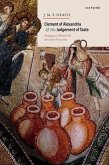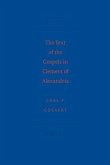This study deals with Clement of Alexandria's interpretation of evil and free will in the context of the rising Christianity, the influence of Near Eastern and Greek thought on him, his differences from St. Augustine, and how his interpretation affected the rise of the Eastern Christian thought. The book also treats briefly the subject of man's personal aim in life perceived by Clement as the supersession of his nature. Failure to realize this personal aim in life leads to alienation from God, and death. The moral dilemma of Clement's interpretation of evil as failure of life's aim is not a conventional explanation of good and evil but something much more: the option between real life and death. Consequently, Clement's idea of evil refers to existential problems and ontological realities.
Hinweis: Dieser Artikel kann nur an eine deutsche Lieferadresse ausgeliefert werden.
Hinweis: Dieser Artikel kann nur an eine deutsche Lieferadresse ausgeliefert werden.








